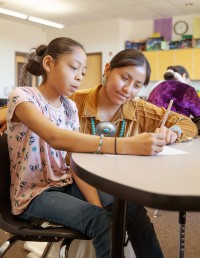Groups Detail “Chilling Effects” of Secretary DeVos’s Unlawful Rollback of Title IX Survivor Protections
In New Legal Filing, Plaintiffs Say Abandoned Guidance Deters Victims From Coming Forward, Delays Investigations of Sexual Violence Claims
Washington, D.C. — Advocates for campus survivors of sexual violence submitted new court filings that detail the barriers to justice erected by Secretary Betsy DeVos’s unlawful rollback of Title IX protections. The submissions were attached to the groups’ motion for summary judgment in their ongoing lawsuit to reinstate protections for student survivors.
The plaintiff groups SurvJustice, Equal Rights Advocates, and Victim Rights Law Center are represented by Democracy Forward, the National Center for Youth Law, and the National Women’s Law Center. The suit asserts that the Trump administration’s actions violate federal law because the administration failed to provide any reasoned explanation for the 2017 rollback, and did not adequately consider the harmful effects on students.
SurvJustice has seen a 36% decrease in the number of sexual violence surviors seeking assistance between 2016 to 2018, many students citing concerns about the admistration’s 2017 Title IX changes. For at least three clients, their Title IX complaint has been pending for 200-500 days.
As a result of the unlawful 2017 rollback:
-
Confidentiality is reduced as schools must disclose the identity of survivors to the alleged assailant
-
The accused is allowed to directly question a survivor during a Title IX proceeding
-
Schools can refuse to investigate off-campus misconduct, leaving students of community colleges and vocational schools at particular risk because they do not live on campus
-
Title IX proceedings can be unreasonably delayed as schools no longer have to consider a 60-day benchmark period to swiftly resolve investigations
Equal Rights Advocates described the case of a community college professor who “demanded that certain female students answer his calls after hours, meet him off campus to [review] coursework, and allow him to drive them home after class.” Under the Trump administration’s changes, schools could choose to ignore these acts of harassment.
This is a “fundamental disregard for the purpose and meaning of Title IX,” the Victim Rights Law Center submitted.
Case Timeline
- In January 2018, SurvJustice, Equal Rights Advocates, and Victim Rights Law Center filed suit against Secretary DeVos’s harmful Title IX policy.
- A second amended complaint was filed in October 2018.
- Plaintiffs filed an amended complaint in the United State District Court for the Northern District of California in April 2019.
- The motion for summary judgment was filed July 25, 2019.
- Following additional briefing, the parties anticipate oral arguments in October 2019.
###
Democracy Forward is a nonprofit legal organization that scrutinizes Executive Branch activity across policy areas, represents clients in litigation to challenge unlawful actions, and educates the public when the White House or federal agencies break the law.
SurvJustice is a survivor-led national not-for-profit organization that increases the prospect of justice for all survivors of sexual violence through effective legal assistance, policy advocacy, and institutional training.
Equal Rights Advocates (ERA) is a national civil rights organization dedicated to protecting and expanding economic and educational access and opportunities for women and girls.
Victim Rights Law Center is the first nonprofit law center in the country solely focused on the legal needs of sexual assault victims.
The National Women’s Law Center has worked for more than 40 years to protect and promote equality and opportunity for women and families. We champion policies and laws that help women and girls achieve their potential at every stage of their lives — at school, at work, at home, and in retirement. Our staff are committed advocates who take on the toughest challenges, especially for the most vulnerable women.
The National Center for Youth Law is a non-profit law firm that helps low-income children achieve their potential by transforming the public agencies that serve them.





